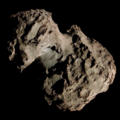322P/SOHO
322P/SOHO is the first periodic comet to be discovered using the automated telescopes of the SOHO (SOlar and Heliospheric Observatory) spacecraft, and second to be given a numbered designation, after 321P/SOHO.[8] At perihelion, it is six times closer to the Sun than the planet Mercury.
Observational history
The comet was first spotted by Terry Lovejoy after analyzing SOHO imagery on 4 September 1999.
After Kazimieras Černis spotted another SOHO comet in 2003, Sebastian F. Hönig, later determined that both P/1999 R1 and P/2003 R5 might be the same object, where he predicted its return in 2007.[9][10] His calculations were later proven correct when it was successfully recovered by Bo Zhou as P/2007 R5 after analyzing SOHO images on 10 September 2007.[11] It became one of the first comets that SOHO has discovered that is confirmed to be periodic.
Bo Zhou recovered the comet once again on September 6, 2011.[6] It was observed again in September 2019.[12]
Possible connection with the Great Comet of 254 AD
It has been suggested that 322P/SOHO is associated with a comet observed in November–December 254 AD and is mentioned in East Asian sources to have an extremely long tail.[2][13] If the association is correct, it is possible that the comet split in 254 AD, resulting in intense cometary activity, but activity decreased afterwards as the comet lost most of its volatiles, and no longer displays a tail or a prominent coma. Current activity is fueled by sodium sublimation.[13]
Physical characteristics
322P/SOHO is either an extinct comet or an active asteroid.[14] Light-curve and infrared observations by Spitzer in 2016 suggest that its nucleus is probably only 150–320 m (490–1,050 ft) in diameter, with a rotation period lasting 2.8±0.3 hours.[7]
Orbit
| Perihelion distance at different epochs[15] | |||||||
| Perihelion date |
Perihelion (AU) | ||||||
|---|---|---|---|---|---|---|---|
| 1955-04-18 | 0.0651 | ||||||
| 1983-08-08 | 0.0597 | ||||||
| 1999-09-05 | 0.0563 | ||||||
| 2015-09-04 | 0.0535 | ||||||
| 2019-08-31 | 0.0506 | ||||||
| 2023-08-21 | 0.0501 | ||||||
| 2027-08-11 | 0.0505 | ||||||
| 2031-08-01 | 0.0479 | ||||||
| 2047-05-23 | 0.0451 | ||||||
322P/SOHO is a member of the Kracht sungrazer family of comets.[1] On April 11, 1947 it passed about 7.1 ± 0.22 million km (4.4 ± 0.14 million mi) from Earth.[4][16]
Exploration
On 2 September 2019, NASA's Parker Solar Probe incidentally passed the tail of 322P/SOHO at a distance of 0.012 AU (1.8 million km), making direct measurements of the comet as it interacts with the solar wind.[17]
See also
References
- ^ a b "Periodic Comets identified by SOHO". The Sungrazer Project. Retrieved 26 May 2025.
- ^ a b G. W. Kronk; M. Meyer; D. A. J. Seargent (1999). Cometography: A Catalog of Comets. Vol. 1: Ancient–1799. Cambridge University Press. p. 55. ISBN 978-0-521-58504-0.
- ^ a b "Horizons Batch for 322P/SOHO on 2023-Aug-21" (Perihelion occurs when rdot flips from negative to positive). JPL Horizons. Archived from the original on 24 June 2023. Retrieved 12 August 2023. (JPL#10/Soln.date: 2016-Oct-27)
- ^ a b "322P/SOHO – JPL Small-Body Database Lookup". ssd.jpl.nasa.gov. Jet Propulsion Laboratory. Retrieved 16 August 2023.
- ^ "322P/SOHO Orbit". Minor Planet Center. Retrieved 10 April 2017.
- ^ a b "SOHO's new catch: its first officially periodic comet". European Space Agency. 25 September 2007. Retrieved 19 November 2007.
- ^ a b M. M. Knight; A. Fitzsimmons; M. S. P. Kelley; C. Snodgrass (2016). "Comet 322P/SOHO 1: An asteroid with the smallest perihelion distance?". The Astrophysical Journal Letters. 823 (1): 6–12. arXiv:1604.07790. Bibcode:2016ApJ...823L...6K. doi:10.3847/2041-8205/823/1/L6.
- ^ K. Battams (30 January 2012). "The Tale of a Very Shy Comet..." The Sungrazer Project. Archived from the original on 3 March 2012. Retrieved 31 January 2012.
- ^ S. F. Hönig (2006). "Identification of a new short-period comet near the sun" (PDF). Astronomy & Astrophysics. 445 (2): 759–763. arXiv:astro-ph/0509168. Bibcode:2006A&A...445..759H. doi:10.1051/0004-6361:20053991.
- ^ V. Jaggard (25 September 2007). "Photo in the News: Sun Probe Spies New Periodic Comet". National Geographic News. National Geographic Society. Archived from the original on 11 October 2007. Retrieved 26 September 2007.
- ^ Marsden, Brian (18 September 2007), "MPEC 2007-S16 : COMET P/1999 R1 = 2003 R5 = 2007 R5 (SOHO)", Minor Planet Electronic Circular (2007-S16)
- ^ The case of the Sun-diving asteroid that thinks it's a comet Phil Plait, September 4, 2019
- ^ a b J. Cui; G. Li; Y. Zhao (2025). "322P/SOHO: The Counterpart of a Historical Comet in 254 CE?". Icarus. 429: 116382. Bibcode:2025Icar..42916382C. doi:10.1016/j.icarus.2024.116382.
- ^ Rainer Kracht (7 September 2011). "Recent comet discoveries 2123-2137". Yahoo Groups: SOHO Hunter. Archived from the original on 5 January 2013. Retrieved 11 September 2011.
- ^ Kinoshita, Kazuo (9 June 2015). "322P/SOHO past, present and future orbital elements". Comet Orbit. Retrieved 16 August 2023.
- ^ "Horizons Batch for 1947-Apr-11 Earth approach uncertainty". JPL Horizons. Retrieved 16 August 2023. RNG_3sigma = uncertainty range in km. (JPL#10/Soln.date: 2016-Oct-27)
- ^ J. He; B. Cui; L. Yang; C. Hou; L. Zhang; et al. (2021). "The Encounter of the Parker Solar Probe and a Comet-like Object Near the Sun: Model Predictions and Measurements". The Astrophysical Journal. 910 (1): 7–18. arXiv:2012.00005. Bibcode:2021ApJ...910....7H. doi:10.3847/1538-4357/abdf4a.
External links
- 322P/SOHO at the JPL Small-Body Database
- SOHO's first officially periodic comet
- SOHO Comets (view real-time images)

